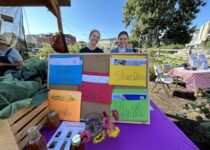As a year-long volunteer addressing racial, economic, and social injustices, my main focus in Philadelphia…

Food is My Love Language: Finding Connection & Growth at a Refugee Food Pantry
“What did one beet say to the other?” “I dunno, beats me!”
¡Hola! Salaam! Bonjour, namaste!
These are words I get to use every day—with a smile and perhaps a slight bow, a handshake, or a hand over the heart—as I welcome clients into the multicultural food pantry at Nationalities Service Center (NSC).
My service site is a refugee resettlement agency in the bustling center of Philadelphia. Each year, the U.S. government vets and places hundreds of immigrants in this city from every continent around the world, and NSC is one of the organizations helping them start a new life in America. It takes a lot of work to get a family set up in a new country: job hunts for adults, school enrollments for kids, language learning and medical appointments and culture shock for everyone.
With so much to do in the first months after their arrival, many clients need help making ends meet. But local food pantries are typically set up for American-born populations facing a distinct set of challenges. A man from central Africa may speak three languages, but if one of those languages isn’t English, he’ll have a hard time communicating his needs at a standard food pantry. An Afghan mother may refrain from taking a box of mac and cheese for her kids because she can’t tell if it contains animal products prohibited by her religion. And both clients may wish the food pantry had more lentils or red beans to cook with.
That’s why NSC started an in-house food pantry to help recently arrived refugees and other immigrants find culturally familiar foods and trauma-informed services as they adapt to a new life in this strange land called America. And since the food pantry opened, MVC volunteers have been integral to the program. It started with this year’s New York City volunteer Amber, who had served at NSC with Mercy Volunteer Corps before the pandemic. As in-person programs started up again, MVC volunteers Mikayla and Colleen welcomed clients back with big smiles and attentive care. What brings MVC volunteers back year after year? For me, this service role has been an exceptional match not only for my interest in foreign languages and cultures, but also for the core values that drew me to MVC in the first place.
Compassionate Service & Social Justice
From one point of view, my job is about things: I’m moving fruits, veggies, and dry goods from the pantry’s shelves into clients’ bags. But a deeper look reveals that it’s really about people. When I walk into work each day, I know I won’t just be filling empty stomachs. My real job is to welcome, serve, and learn from complex human beings.
And because my job is to interact with humans, it means paying attention to accessibility, cultural backgrounds, and even personality quirks. In a given week, I hear about ten different languages in the pantry, so we make extra time for clients facing language and literacy barriers. We also get visitors of all different ages. I get to chat with teenagers picking up groceries for the whole family, keep toddlers out of trouble while their parents pick out food, and laugh with grandparents who love a good bargain. Even when I need to act as a gatekeeper in the pantry— putting a limit on how many tomatoes a family can take, for example, to make sure there are enough for all our clients— I am learning to exercise that authority gently, seeking to afford my clients greater agency and dignity as they pick out the food they need.
Simple Living & Community
MVC’s focus on simple living also helps me empathize with clients better. I don’t have a family to support, but our modest budget regularly reminds me that every dollar saved counts. The volunteer stipend has also helped me get more creative in connecting with friends. With help from my own community member, Lynore, I’ve gotten to gather groups of coworkers for free events around the city, hot chocolate and games in our apartment, and walks through Philadelphia’s parks. But the sense of community expands beyond my coworkers to include my clients. Although we maintain professional boundaries, the people I serve are not mere recipients. Some have offered reusable bags or gently used baby clothes so that we can give them to other clients. Some love to teach me the names of fruits and vegetables in their home languages. And some clients have honored me with pieces of their stories.
Spiritual Growth
Most of my refugee clients have endured loss and pain that I can only begin to imagine. As I listen, I have often marveled at the strength they have to carry on. Some days, the sheer weight of these stories, all these ways that people are encountering the world’s brokenness, threatens to crush me. I fear it would crush me, if I did not know a God who is bigger than me, wiser than me, and who cares about my clients’ suffering far more than I ever can. Each Friday, I get to reflect over the week’s conversations as I log my clients’ visits in our computer system. As I input each name, I often say a quick prayer for the client and their family, asking that their physical needs be met, that they maintain a sense of dignity as they encounter difficulties in their transition, and that they find rich community even in this foreign land.
So day by day, I welcome immigrants into the pantry. I answer their questions, offer food, and wrestle with my own questions of trying to serve many people with limited resources. Yet in the midst of these questions, I cannot shake the feeling of being abundantly blessed. I feel lucky to learn from such diverse experiences and cultures and languages. I am continually amazed by the communities that have embraced me here in Philadelphia. And I find confidence to serve because I am held in the loving hands of a capable God.
Jonathon Borja: Philadelphia, Pennsylvania



This Post Has 0 Comments